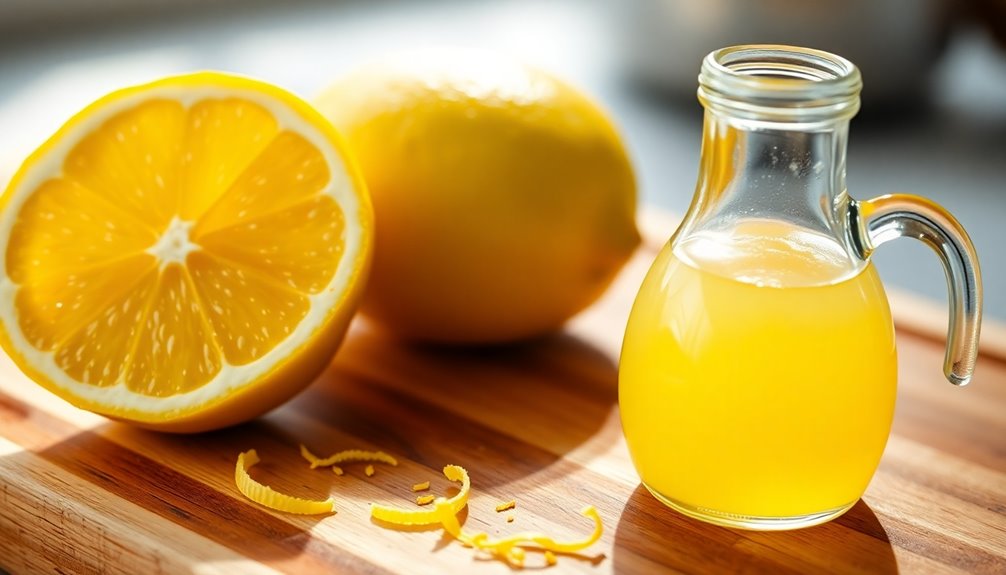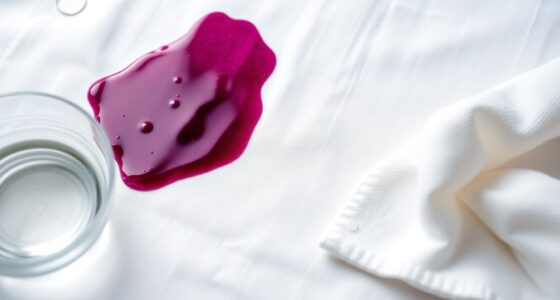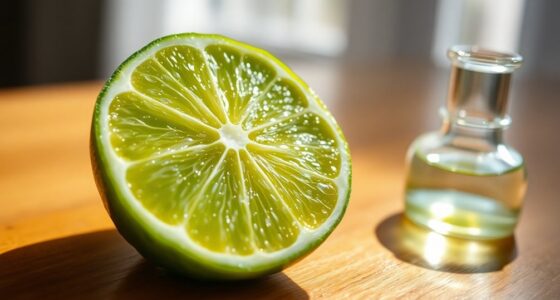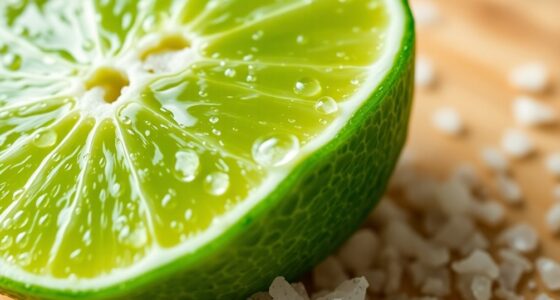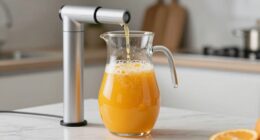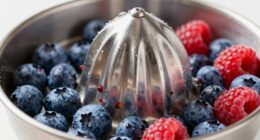A medium lemon typically gives you about 3 tablespoons of juice, while larger lemons can yield up to 4 tablespoons. If you're after half a cup of lemon juice, you'll need around 3 medium or 2 large lemons. For a full cup, count on about 6 medium or 4 large lemons. Keeping a few extra lemons on hand is a smart move, especially if you're unsure of their juiciness. There's more to discover about lemon zest and culinary uses too!
Key Takeaways
- One medium lemon yields about 3 tablespoons of juice.
- Larger lemons can produce up to 4 tablespoons of juice.
- For recipes needing ½ cup of juice, use approximately 3 medium or 2 large lemons.
- For 1 cup of lemon juice, about 6 medium or 4 large lemons are required.
- Always have extra lemons on hand to account for unexpected low yields.
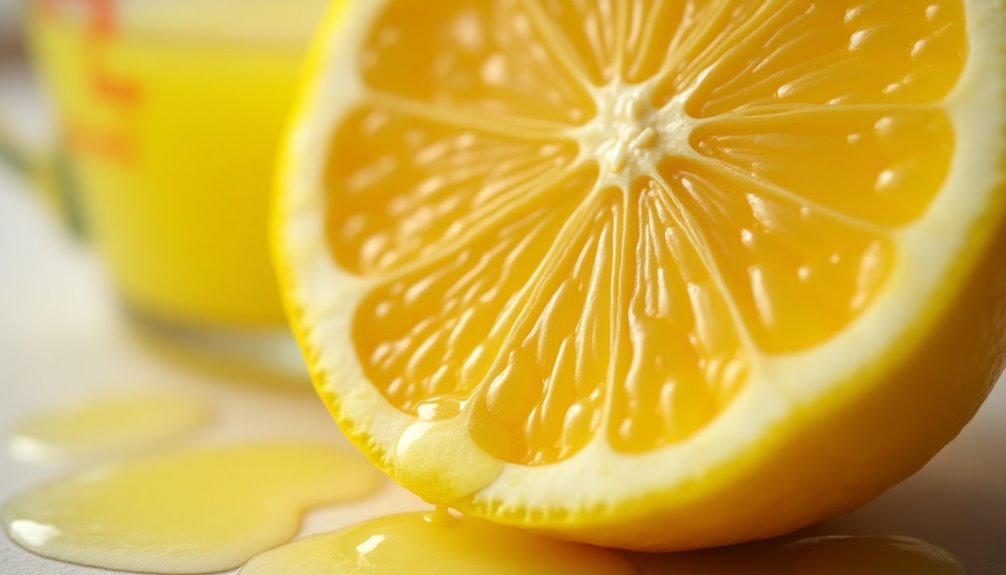
Have you ever wondered how much juice you can expect from a single lemon? If you're diving into a recipe that calls for fresh lemon juice, knowing the amount you'll get from each lemon can save you time and frustration in the kitchen. Generally, a medium lemon yields about 3 tablespoons of juice, making it a reliable choice for most culinary needs.
If you're working with larger lemons, you might be pleasantly surprised, as they can produce up to 4 tablespoons, which is about a quarter cup of juice.
When planning your cooking or baking, keep in mind that one medium lemon is usually equivalent to approximately 3 tablespoons of juice. So, if a recipe calls for a specific amount of lemon juice, you can easily calculate how many lemons you'll need. For instance, if you need ½ cup of lemon juice, you're looking at around 3 medium lemons or just 2 large lemons. This can really streamline your shopping list!
If you're preparing a dish that requires 1 cup of lemon juice, you'll need about 6 medium lemons or 4 large ones. Having the right amount of juice is crucial for achieving the perfect balance in your recipe. Whether you're making a zesty salad dressing, a refreshing lemonade, or a tangy dessert, the citrus flavor from fresh lemon juice and lemon zest can elevate your dish to another level.
It's a good idea to have a few extra lemons on hand whenever you're working with recipes that require lemon juice. Sometimes, lemons can be unexpectedly dry, and you mightn't get the amount of juice you need from just one. By keeping a stash of lemons available, you'll ensure you can always get the amount of juice you require.
Additionally, remember that the zest of a lemon is just as important as the juice. It adds a bright, aromatic flavor that can enhance your dishes. If you're zesting lemons for a recipe, it's helpful to know that you can typically get about a teaspoon of zest from one medium lemon.
This zest can be a wonderful complement to the fresh lemon juice, creating a more dynamic flavor profile.
Frequently Asked Questions
Can You Substitute Bottled Lemon Juice for Fresh Lemon Juice?
Yes, you can substitute bottled lemon juice for fresh lemon juice, but keep in mind the differences.
Bottled juice often lacks the vibrant flavor and nutrients of fresh juice, so the taste of your dish might change. If you're using it in a recipe, start with a smaller amount, taste, and adjust as needed.
How Much Lemon Juice Is Equal to One Fresh Lemon?
So, you think you can just squeeze a lemon and get a magical amount of juice, huh?
Well, guess what? On average, a medium lemon gives you about 3 tablespoons of juice.
If you're feeling adventurous and grab a large lemon, you might get around 4 tablespoons.
Smaller lemons? You're looking at 2 tablespoons.
How Much Real Lemon Equals 1 Lemon?
When you're looking to substitute real lemon juice for a fresh lemon, you'll find that about 3 tablespoons of juice corresponds to one medium lemon.
If you've got larger lemons, they can yield up to 4 tablespoons, which can save you a bit of effort.
Is 100% Lemon Juice in a Bottle the Same as a Lemon?
When you think of bottled lemon juice, you might imagine it as a convenient stand-in for fresh lemons.
However, it's not quite the same. While 100% lemon juice offers a quick alternative, it lacks the vibrant flavor and nutritional benefits of fresh lemons.
You'll find it often needs more than just a squeeze to match that zesty punch you get from the real deal.
Conclusion
In conclusion, when you need the juice of one lemon, you can typically rely on about 2 to 3 tablespoons of fresh lemon juice. It's a handy trick that'll save you time in the kitchen—almost like having a microwave in the Renaissance! Remember, fresh juice always packs more flavor than bottled, so squeeze those lemons when you can. Now you're ready to tackle any recipe with a zesty kick!
Cindy thoroughly researches juicing trends, techniques, and recipes to provide readers with practical advice and inspiration. Her writing style is accessible, engaging, and designed to make complex concepts easy to understand. Cindy’s dedication to promoting the advantages of juicing shines through her work, empowering readers to make positive changes in their lives through the simple act of juicing.

